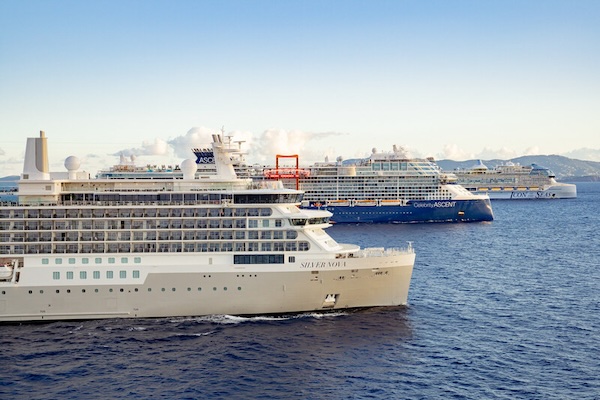Royal Caribbean Group has unveiled an industry-first loyalty initiative known as the ‘status match’ programme.
This programme allows for reciprocal tier status across its Royal Caribbean International, Celebrity Cruises, and Silversea brands.
Introduction to the Status Match Initiative
Royal Caribbean Group has announced a pioneering initiative in the cruise industry called the ‘status match’ programme, set to commence from June 5. This initiative aims to provide passengers with reciprocal tier status across its three major brands: Royal Caribbean International, Celebrity Cruises, and Silversea.
By aligning the loyalty schemes, members of the Crown & Anchor Society, Captain’s Club, and Venetian Society can enjoy equivalent tier benefits regardless of the brand they sail with. This approach is designed to retain customers by enhancing their cruise experiences across different cruise lines under the Royal Caribbean Group umbrella.
Benefits of the Status Match
This status match is not just a novel concept but a significant enhancement to the overall cruise experience. Members will retain their loyalty programme benefits, which are now expanded across over 50 ships reaching nearly 1,000 global destinations. Such an offering promises to increase customer retention and satisfaction by providing more value and flexibility.
Each participating brand’s loyalty programme consists of five tiers, allowing passengers to enjoy specific onboard benefits tailored to their loyalty status. Thus, guests can continue to appreciate and utilise their earned benefits in a broader context, promoting a lifetime of brand engagement and loyalty.
Leadership and Vision
Royal Caribbean Group’s chief executive, Jason Liberty, emphasizes the group’s commitment to enriching customer experiences. “We strive to provide guests with experiences within our portfolio of brands that meet them for all of life’s moments,” said Liberty.
He sees this initiative as a part of the company’s broader strategy to transform a single memorable journey into continuous, rewarding travel experiences, thus making cruises an integral part of customers’ lifelong travel plans.
Operational Strategy and Implementation
The operational aspect of this initiative involves enrolling in each brand’s programme to facilitate the status matching. This ensures seamless integration and utilization of benefits when sailing with any sister brand within the Royal Caribbean Group.
By streamlining processes and aligning the benefit structures across their brands, the group aims to offer a unified and enhanced onboard experience, while reducing the complexities typically associated with multi-brand loyalties.
This strategic alignment not only simplifes customer interactions across brands but also positions Royal Caribbean Group as a leader in customer-centric cruise experiences.
Customer Engagement and Retention
The introduction of this loyalty enhancement programme is expected to drive engagement by providing customers with diversified choices and consistent experiences. Passengers are likely to feel more inclined to explore different brands under the same corporate umbrella knowing their loyalty status is recognised across board.
Retaining loyal customers is central to any business strategy, and by introducing such an inclusive programme, Royal Caribbean Group is setting a new standard in the cruise industry for customer retention and satisfaction.
The goal is not just to attract new customers, but to maintain and deepen relationships with existing patrons. This initiative fosters brand loyalty through recognition and rewards, making the competitive cruise market more navigable for returning travellers.
Challenges and Market Dynamics
Implementing a status match programme of this scale does not come without challenges. It requires precise coordination and seamless management across different operational teams and systems. Yet the Royal Caribbean Group appears poised to tackle these hurdles through strategic planning and innovation.
As market dynamics evolve with increasing competition and heightened customer expectations, innovative programmes like these help brands differentiate themselves. Royal Caribbean Group’s forward-thinking approach could very well set the benchmark for similar initiatives across the cruise sector.
Industry Implications
The introduction of status match schemes by a major player such as Royal Caribbean Group could prompt other cruise lines to adopt similar strategies. This industry-first move highlights a growing trend towards integrated loyalty solutions and could influence the broader travel sector.
By leading this change, Royal Caribbean Group not only enhances its competitive edge but also catalyses a shift in how cruise lines globally perceive and value customer loyalty. In the long term, this could drive further innovations in loyalty programmes across the industry.
Conclusion
Ultimately, Royal Caribbean Group’s status match initiative represents a significant step forward in enhancing passenger experiences and fostering loyalty across its brand spectrum. As the cruise industry continues to evolve, such transformative strategies are crucial in maintaining competitive advantage and ensuring sustained growth.
The status match initiative is set to enhance customer experiences, increase loyalty, and set a new standard in the cruise industry.
As the cruise market adapts to evolving demands, such innovations by Royal Caribbean Group will play a crucial role in maintaining a competitive edge.

